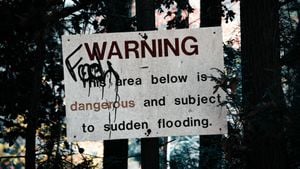Russia is once again ratcheting up its rhetoric following Ukraine's recent missile strikes, marking a significant escalation in the conflict. Just as tensions have reached new heights, Russian officials have issued stark warnings, hinting at the prospect of nuclear engagement if certain red lines are crossed.
On November 20, reports emerged detailing Ukraine’s launch of six ATACMS missiles targeting Russian locations, marking the first use of these US-made tactical missiles against Russia. This strike was confirmed by Russia's Defense Ministry, stating the missiles were fired across the border, leading to varied responses from both sides of the conflict.
Russian Foreign Minister Sergey Lavrov spoke at the G20 summit and emphasized the gravity of the situation, characterizing the missile launches as indicative of Ukraine's intention to escalate the war. He remarked, "We will be taking this as a qualitatively new phase of the Western war against Russia. And we will react accordingly.” Lavrov’s statements reflect not just concerns over military tactics, but fears of deepening involvement from Western nations.
Meanwhile, the deputy chair of Russia’s Security Council, Dmitry Medvedev, lamented this latest development, stating unequivocally on social media, "That means World War III." His comments echo the sentiments of several officials who have suggested dire consequences could ensue following this act.
According to various sources, Ukraine targeted sites within the Bryansk region, which borders Ukraine to the north. Russia reported intercepting five of the six missiles, but one missile reportedly caused damage, stoking tensions even higher. Lavrov insists the West should take responsibility for this escalation, blaming their continuous military support for Ukraine.
Adding another layer to these military threats, President Vladimir Putin recently broached the topic of nuclear strategy during his speeches. The Kremlin explicitly stated its right to use nuclear weapons if conventional attacks threaten its sovereignty. This message was amplified by Lavrov's remarks, which reinforced the seriousness with which Russia views this latest development.
The U.S. has been closely monitoring the situation and has reiterated its commitment to support Ukraine, regardless of rhetoric from Russia. According to various reports, the United States has explicitly limited the operational reach of Ukrainian missiles, and the current use of ATACMS is seen as crossing previously respected red lines.
Across the political spectrum, reactions to these developments have been swift. British Labour leader Keir Starmer pointed out the irresponsible nature of Lavrov's comments, stating these types of threats would not deter any support for Ukraine. Starmer emphasized the need for continued backing of Ukraine to counteract Russian aggression, noting, "We won't be backing down on our commitments to Ukraine."
U.S. State Department spokesperson Matthew Miller has condemned Russia's nuclear threats as reckless, pointing to the serious ramifications they could have not just for the Ukraine conflict but for global stability. Discussions surrounding the war have ventured far beyond military support, as governments weigh the political consequences of their responses and the potential for escalation.
The fears stemming from Lavrov and Medvedev's statements go hand-in-hand with the announcement of significant changes to Russia’s nuclear doctrine. Specifically, any attack from non-nuclear states, provided they are backed by nuclear allies, would be interpreted as a coordinated act against Russia. This move has elicited reactions globally, with many condemning it as not just irresponsible, but indicative of Russia's strategy to broaden the scope of potential conflict.
Ukrainian officials have openly criticized Russia's strategy, pointing out its nature of projecting power through threats rather than genuine military prowess. The war has now passed its 1000-day mark, but the rhetoric continues to escalate, proving the conflict as far from settled.
The world watches anxiously as both sides prepare for what could be the most dangerous phase of the conflict yet. Each missile launch and retaliatory threat sets the stage for what many fear could spiral out of control if diplomacy does not lead the way to dialogue and potential peace.
With both Ukraine and Russia drawing lines in the sand, the focus shifts to whether Western nations will adjust their military support strategies or stand firm against the veiled threats being issued by the Kremlin. What happens next will be pivotal, not just for Ukraine but for the broader geopolitical climate amid mounting tensions between NATO and Russia.



